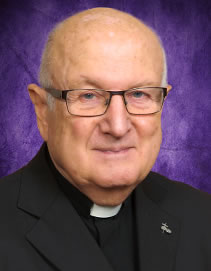
From the Director
Although all Columbans may not agree with me, I think our life as Columbans has three important hallmarks.
Community
The first of these is our community life; despite living quite separately, we are a brotherhood. Many of us have lived alone in isolated places for years; the simple fact is that mission sometimes demands it. On the other hand, we Columbans are sometimes referred to as a “family.” Although a few of us are in fact related to each other in the normal way as brothers or cousins, and some have had sisters who are Columban Sisters, most of us are not held together by a family connection. Many of our relatives have been generous benefactors over the years, supporting Columban mission, not only by giving a son or a brother, but also by backing us financially and in numerous other ways. I think to say we are a family does say something about the way we live our lives, about the quality of our community life. I myself have been interacting with Columbans since the early 1960s.
Though I have been in a position to meet nearly all Columbans, there may have been a few I have not met face to face, but for every one of them there are others that I have met on multiple occasions in multiple places. Just as in a family it is not wise to write anyone off, you just may be sitting across the table from them at your nephew’s wedding. In the Columban world, you may meet, as I have, a priest you first met on mission in Japan, who years later is working in Fiji when you visit that mission, who defended his doctoral thesis in Rome when you were there for a beatification, and who sits across from me at our assembly in Taiwan. Some people say we look alike, but that is another story!
Our life as Columbans has three important hallmarks: Community, Spirituality and Walking with the Poor.
All this meeting and meeting again means that we build up a shared history with each other. To know and be known, to accept others and be accepted by them, to respect others’ contributions and be respected for what you have accomplished, is all part of the Columban community experience. A shared history means shared stories, some of them funny, some sad, some understated, some exaggerated.
Spirituality
A life of prayer should both sustain and challenge. When it comes to spiritual practices, I would be the first to admit that the glorious way of celebrating the liturgy of the hours of the Benedictine tradition is not a normal part of our Columban life of prayer. In fact, Columbans follow a variety of spiritual practices and a variety of spiritualities. But the first generation of Columbans did decide that fairly early in our seminary career we would all do a form of the “Spiritual Exercises of St. Ignatius,” the Jesuit 30-day retreat. It continues to be an important part of our training. I think the key to the exercises is listening. Certainly being on mission in a foreign land provides many opportunities for discerning the will of God, not only by listening to the Word of God in the scriptures, but also as revealed in the circumstances of our lives and the lives of the people among whom we are working.
Walking with the Poor
And the third hallmark is a commitment to making the struggles of the poor our struggle. Concern for the poor, service to them, making their struggle our own is indeed a place where what we are about comes face-to face with our spiritual motivation. Readers of our magazine know this commitment takes many forms in many places. Our work in Pakistan, for example, is with some extremely poor tribal people. Even prosperous, “developed” countries like Japan and Korea were poor and struggling from the destruction of war when we first went there and continue to have pockets of poverty today. In Latin America, the Columbans gravitated to the poor areas on the periphery of the great cities of Lima and Santiago and have remained there year in and year out.
Three hallmarks remind us who we are, what we are about and, I hope, where we are going.